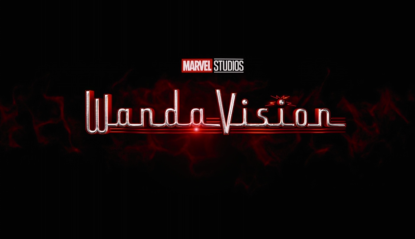The show starts out as a black-and-white 1950s sitcom starring Wanda Maximoff (Elizabeth Olsen) and Vision (Paul Bettany). For the uninitiated, Vision is an android (one of my favorite facts is that Paul Bettany began his journey in the Marvel Cinematic Universe in 2008 as the voice of J.A.R.V.I.S., Iron Man's AI helper - decades later, that simple voiceover work has morphed into him having to endure hours of makeup and costuming to bring Vision to life). Despite Wanda's telekinetic and magical abilities and Vision not being an actual human, the two are attempting to blend into the town of Westview, which is brimming with sitcom characters and tropes. Their house is almost identical to the Petrie household from The Dick van Dyke Show, and there's a typical sitcom plot of misunderstandings where Vision tries to bring his boss and his wife home for dinner while Wanda is unprepared and turns into a flustered housewife who has to seek help from the nosy but helpful neighbor, Agnes (the great Kathyrn Hahn, who I was so happy to see in the first episode, and then increasingly happy to see as the series progressed and she got to show us everything she's got).
Yes, that's how the first episode begins, but it all gets a bit eerie towards the end and it becomes clear that something is amiss. However, you're not going to get any clarity on what exactly is amiss until Episode 4. Until then, the show takes you on this marvelous parade of evolving television, bursting into a glorious technicolor 70s style at the end of the second episode, where things get much more Brady Bunch-esque. Even after the reveal of what's happening in the real world outside this fictional Westview sitcom, we get to see WandaVision traipse through the decades, as they head into a more 80's Family Matters show, enjoy a little Malcolm in the Middle action, and eventually get to homages to Modern Family and the mockumentary-style that became so popular in the 2000s (when Vision does a very Jim Halpert-esque look to camera at one point, I laughed out loud - it was amazing). If you've watched any of those shows, you will deeply admire what is going on in WandaVision, because there is so much detail being poured into every frame as they recreate these sitcoms. The production design and costuming is absolutely spot on, the cinematography is excellent, with different camera lenses and aspect ratios being used depending on the decade being portrayed, and the actors studied these sitcoms assiduously, changing their accents and mannerisms to capture the nuances of each passing phase. Watching this show is like taking a seminar on the history of television, except far more entertaining.
Directed by Matt Shakman and created by Jac Schaeffer, this show is intricately plotted and a storytelling tour-de-force. You can tell they were paying attention to plot and pacing because the show is only nine episodes - it was initially meant to be ten, but they whittled it down to suit the narrative, which is a level of humility that is rare to find among many American showrunners. That commitment to story is what I have always loved about Marvel. They don't make bloated movies, they tend to hone in on exactly what needs to be told and get on with it. That being said, I watch Marvel movies more for the levity and fun action rather than the emotional baggage of superheroes. And this is a show that is exceedingly about emotional baggage. Olsen and Bettany are incredible actors and I was rooting for them all the way, but the finale was too dialogue-heavy for my liking. I have never been able to care when Marvel movies get too involved in their own mythology - I don't remember any of it, I don't read the comics, I am not invested in those intricacies. As such, my enjoyment of this show centered on the excellence of the television gimmick and its execution - everything else was...fine. I realize that Marvel fans may had the exact opposite reaction, and that speaks to the genius of this show. Whether or not you care about the MCU, there's something in here for everyone.
WandaVision is a modern TV classic, a show that manages to glorify all the TV we watched before it, as well as signaling how far TV has come along since the 1950s. It was complex, twisty, slightly unsettling, and kept you guessing. It was firing on all cylinders in every department and was clearly a labor of love for everyone involved. And during a pandemic, it was a much-needed watercooler show that helped keep the days from blending together like a ceaseless blur. Did I love every second of this show? No. But was it a solid piece of entertainment for two months? Hell yes.

No comments:
Post a Comment